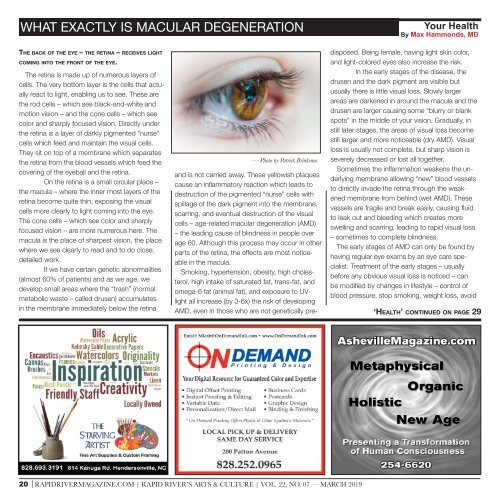You also want an ePaper? Increase the reach of your titles
YUMPU automatically turns print PDFs into web optimized ePapers that Google loves.
WHAT EXACTLY IS MACULAR DEGENERATION<br />
Your Health<br />
By Max Hammonds, MD<br />
The back of the eye – the retina – receives light<br />
coming into the front of the eye.<br />
The retina is made up of numerous layers of<br />
cells. The very bottom layer is the cells that actually<br />
react to light, enabling us to see. These are<br />
the rod cells – which see black-and-white and<br />
motion vision – and the cone cells – which see<br />
color and sharply focused vision. Directly under<br />
the retina is a layer of darkly pigmented “nurse”<br />
cells which feed and maintain the visual cells.<br />
They sit on top of a membrane which separates<br />
the retina from the blood vessels which feed the<br />
covering of the eyeball and the retina.<br />
On the retina is a small circular place –<br />
the macula – where the inner most layers of the<br />
retina become quite thin, exposing the visual<br />
cells more clearly to light coming into the eye.<br />
The cone cells – which see color and sharply<br />
focused vision – are more numerous here. The<br />
macula is the place of sharpest vision, the place<br />
where we see clearly to read and to do close,<br />
detailed work.<br />
If we have certain genetic abnormalities<br />
(almost 60% of patients) and as we age, we<br />
develop small areas where the “trash” (normal<br />
metabolic waste – called drusen) accumulates<br />
in the membrane immediately below the retina<br />
— Photo by Patrick Brinksma<br />
and is not carried away. These yellowish plaques<br />
cause an inflammatory reaction which leads to<br />
destruction of the pigmented “nurse” cells with<br />
spillage of the dark pigment into the membrane,<br />
scarring, and eventual destruction of the visual<br />
cells – age-related macular degeneration (AMD)<br />
– the leading cause of blindness in people over<br />
age 60. Although this process may occur in other<br />
parts of the retina, the effects are most noticeable<br />
in the macula.<br />
Smoking, hypertension, obesity, high cholesterol,<br />
high intake of saturated fat, trans-fat, and<br />
omega-6 fat (animal fat), and exposure to UVlight<br />
all increase (by 3-6x) the risk of developing<br />
AMD, even in those who are not genetically predisposed.<br />
Being female, having light skin color,<br />
and light-colored eyes also increase the risk.<br />
In the early stages of the disease, the<br />
drusen and the dark pigment are visible but<br />
usually there is little visual loss. Slowly larger<br />
areas are darkened in around the macula and the<br />
drusen are larger causing some “blurry or blank<br />
spots” in the middle of your vision. Gradually, in<br />
still later stages, the areas of visual loss become<br />
still larger and more noticeable (dry AMD). Visual<br />
loss is usually not complete, but sharp vision is<br />
severely decreased or lost all together.<br />
Sometimes the inflammation weakens the underlying<br />
membrane allowing “new” blood vessels<br />
to directly invade the retina through the weakened<br />
membrane from behind (wet AMD). These<br />
vessels are fragile and break easily, causing fluid<br />
to leak out and bleeding which creates more<br />
swelling and scarring, leading to rapid visual loss<br />
– sometimes to complete blindness.<br />
The early stages of AMD can only be found by<br />
having regular eye exams by an eye care specialist.<br />
Treatment of the early stages – usually<br />
before any obvious visual loss is noticed – can<br />
be modified by changes in lifestyle – control of<br />
blood pressure, stop smoking, weight loss, avoid<br />
‘Health’ continued on page 29<br />
20 |RAPIDRIVERMAGAZINE.COM | RAPID RIVER’S ARTS & CULTURE | VOL. 22, NO. 07 — MARCH <strong>2019</strong>















